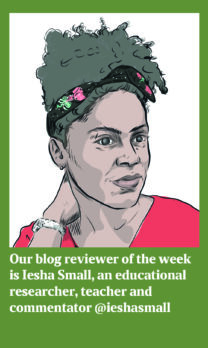Reviewer Iesha Small shares her top edu-blogs from the week
World mental health day October 2017
By @AKnill
“I know about mental health issues, I left the job that triggered many incidents for me so I must be fine now, mustn’t I?”
There is, rightly, much discussion of mental health of pupils in schools and the ongoing inability of CAMHS services to meet demands due to funding issues. We must also remember about the mental health of teachers. When I first met Andy Knill about five years ago, he was a vibrant member of the teaching community, a geography teacher with decades of service with the energy and curiosity of an NQT.
Sadly, the vocation that he loved also contributed to serious periods of ill health, but hopefully by speaking out about mental health we can create a climate for other teachers to be supported in a way that allows them to be effective members of their school communities whilst still being kind to themselves.
Are you enjoying it? Reflections on new motherhood
By @bristol_teacher
“Everyone had an opinion,” writes Claire Nicholls, likening her experience as a new mother to that of being a teacher. Everybody has been to school and everybody has been a child so often people offer unsolicited opinions about how to teach and how to parent. In a majority female profession, it is highly likely that if you are currently working in a school, at least one of your colleagues is off on maternity leave, or about to be, or has just returned.
This blog compares the writer’s actual experience of and feelings about motherhood, to how she perceives wider society is expecting her to feel. It’s directly relevant to school leaders because sadly I have been present in meetings or informal discussions where they automatically assume that female members of staff who are pregnant will be less ambitious or interested in their work when they return. For some this may well be true but it is not for others, and neither camp should be made to feel bad about their choices.
The difference pupil: exclusion and alternative provision
By @lkmco
“I hardly knew what alternative provision meant despite having worked in a school which excluded far more pupils than I like to even contemplate,” writes Loic Menzies, as he sheds light on the Cinderella sector of alternative provision. Personally, I’ve worked in education for more than a decade and, as all my leadership roles being curriculum-based, I have never visited an alternative provision setting.
Last week saw the launch of The Difference, a training and development programme designed to place mainstream teachers in alternative provision settings where it is hoped that they will be able to positively impact some of the most vulnerable young people in our education system.
Loic shares key information, including the killer statistic that each cohort of permanently excluded pupils will eventually cost the state an extra £2.1 billion. These are often our most challenging students and the ones with the most social needs so it’s no surprise that they go on to cost more due to their increased interactions with our health, benefits and criminal justice systems. I agree that “teachers can’t be expected to do everything, [but] we certainly can’t underestimate the urgency of tackling the issue.”
Why we should share our knowledge with others
By @erickimphoto
“I am glad to learn in order that I may share.”
When I first read this blog, originally aimed at photographers, I immediately thought of the parallels as a teacher and a leader. We know that it is our job to share things with students but sometimes that knowledge can be things we have known for a long time. Photographer Eric Kim encourages us to share new things that we have learnt. For me, it’s a reminder to consider how generous we are in sharing new insights with our colleagues, or the wider educational community.













Your thoughts